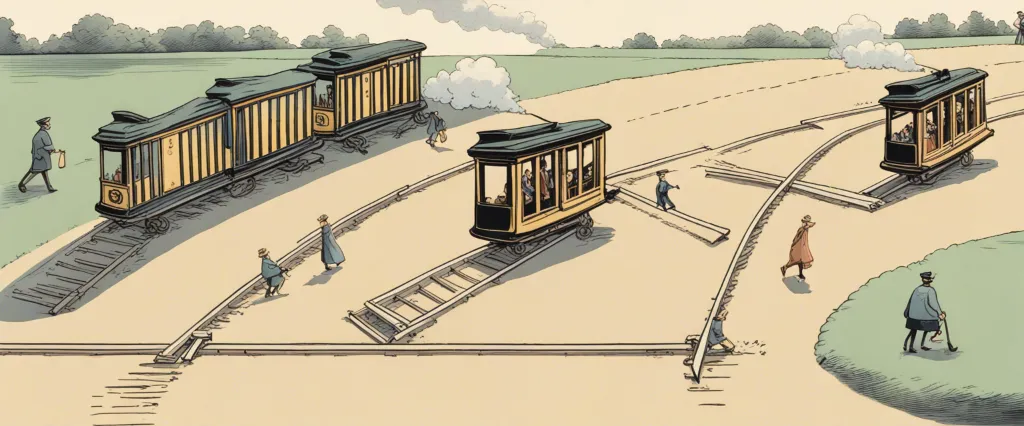——The Trolley Problem by Thomas Cathcart & The Wisdom Of Life by Arthur Schopenhauer

In the realm of philosophical literature, countless works have delved into the complexities of human existence and the pursuit of wisdom. Among these, two prominent texts stand out: “The Trolley Problem” by Thomas Cathcart and “The Wisdom of Life” by Arthur Schopenhauer. While these books may differ vastly in terms of their scope and focus, they both offer unique insights and perspectives on fundamental questions that have intrigued thinkers throughout history.
The Trolley Problem” by Thomas Cathcart delves into the realm of moral philosophy, exploring the ethical intricacies surrounding a hypothetical ethical dilemma. Cathcart presents a scenario where an individual must make a difficult decision: to sacrifice one life in order to save many others. Through rigorous analysis and captivating storytelling, The Trolley Problem brings to light the moral tensions, personal dilemmas, and inherent biases that arise when humans are faced with making difficult choices.
On the other hand, “The Wisdom of Life” by Arthur Schopenhauer traverses a broader philosophical landscape, seeking to understand the meaning and purpose of human existence. Schopenhauer’s work investigates the pursuit of happiness, human desires, the nature of suffering, and the critical role of knowledge and self-awareness. Through thought-provoking philosophical reflections, Schopenhauer illuminates the path towards a content and fulfilling life, drawing on his extensive knowledge of Eastern philosophies, psychology, and metaphysics.
While these two philosophical texts may initially appear distinct in their subject matter, a closer examination reveals intriguing similarities that invite comparison. Both authors grapple with thought experiments and moral dilemmas, albeit with different aims and contexts. Cathcart and Schopenhauer engage readers in a profound exploration of what it means to be human, encouraging introspection and fostering a deeper understanding of our moral and existential choices.
This comparative study aims to delve into these texts, analyzing their respective ideologies, thematic overlaps, and contrasting viewpoints. By examining the similarities and differences between “The Trolley Problem” and “The Wisdom of Life,” we aim to shed light on a range of philosophical topics such as moral reasoning, ethical decision-making, the pursuit of happiness, and the complexities of the human condition.
Moreover, this study intends to unravel the intricacies of different philosophical traditions spanning from contemporary moral philosophy to timeless metaphysical reflections. By juxtaposing these texts, we hope to provide a comprehensive analysis that deepens our understanding of these philosophical inquiries and their relevance in the modern world.
Ultimately, as we embark on this comparative journey between “The Trolley Problem” and “The Wisdom of Life,” we invite readers to join us in exploring the contrasting perspectives these texts offer. By delving into the nuances of Cathcart’s moral dilemma and Schopenhauer’s contemplation of life’s purpose, we hope to shed light on the fundamental questions that have perplexed humanity and inspired philosophical thought for centuries.
Brief Summary of Two Books
The Trolley Problem by Thomas Cathcart
“The Trolley Problem” by Thomas Cathcart is a thought-provoking exploration of ethical dilemmas. The book takes its title from an ethical puzzle known as the trolley problem, which asks whether it is morally permissible to divert a runaway trolley to kill one innocent person rather than allowing it to hit and kill five innocent people. Using this problem as a starting point, Cathcart delves into various philosophical and moral dilemmas, discussing the views of different philosophers and ethical theories.
Throughout the book, Cathcart examines scenarios that raise questions about the value of human life, the nature of right and wrong, and our responsibility towards others. He discusses consequentialism, deontological ethics, virtue ethics, and other moral frameworks, exploring how each would tackle different ethical dilemmas. Along the way, he introduces readers to influential philosophers such as Jeremy Bentham, Immanuel Kant, and John Stuart Mill, among others.
Cathcart uses a conversational and humorous writing style to present complex ethical concepts and engage readers. He provides real-life examples, hypothetical scenarios, and thought experiments to illustrate the practical implications of different moral theories. He also critically analyzes each theory, highlighting their strengths and weaknesses. Additionally, he addresses common objections and poses challenging questions, encouraging readers to reflect on their own ethical beliefs and principles.
Overall, “The Trolley Problem” offers readers a thought-provoking and accessible exploration of moral philosophy through the lens of the famous trolley problem. It aims to stimulate introspection and promote thoughtful ethical deliberation.
The Wisdom Of Life by Arthur Schopenhauer
“The Wisdom of Life” is a philosophical work written by Arthur Schopenhauer, a 19th-century German philosopher. The book explores Schopenhauer’s perspectives on the pursuit of happiness and the meaning of life. He argues that true happiness comes from the fulfillment of our desires and the absence of pain and suffering. However, Schopenhauer believes that our desires are insatiable and that they ultimately lead to disappointment and suffering. He suggests that we should not be driven purely by our wants, but rather adopt a more balanced and moderate approach to life. Schopenhauer also emphasizes the importance of self-awareness, intellectual pursuits, and the cultivation of inner peace to achieve a meaningful and fulfilling existence. Ultimately, “The Wisdom of Life” presents a philosophical perspective on how to live a more satisfying and purposeful life.
Comparison between Two Books

Similarities in Philosophy
Both “The Trolley Problem” by Thomas Cathcart and “The Wisdom of Life” by Arthur Schopenhauer explore philosophical concepts and dilemmas, albeit in slightly different contexts. Here are some similarities in the philosophical aspects discussed in these books:
1. Ethical considerations: Both books delve into issues of ethics and moral choices. “The Trolley Problem” directly presents an ethical dilemma where one must decide between actively causing harm to one person or sacrificing multiple lives. Meanwhile, “The Wisdom of Life” encompasses a broader examination of ethics and the pursuit of a moral life.
2. Examination of consequences: Both texts reflect on the consequences of our choices and actions. In “The Trolley Problem,” the focus is explicitly on judging the consequences of intervening or not intervening in a specific scenario. In Schopenhauer’s work, the consequences of different life choices and approaches are examined in terms of personal fulfillment, happiness, and leading a meaningful existence.
3. Delving into moral intuition: Both books seek to engage readers’ moral intuition and provoke reflection on their own ethical and philosophical beliefs. “The Trolley Problem” presents readers with a moral quandary, inviting them to critically consider their instinctive responses and the underlying ethical principles that guide them. Schopenhauer’s work, although broader in scope, similarly encourages readers to reflect on their own experiences and beliefs to make informed decisions about their own lives.
4. Moral dilemmas and decision-making: Both texts explore the complexities of moral decision-making. “The Trolley Problem” challenges readers to examine how various moral theories, such as utilitarianism or deontology, might guide their choices. In a different vein, Schopenhauer’s work guides readers through various life choices and philosophies, ultimately leading them to consider how their decisions affect their overall life satisfaction and happiness.
5. Consideration of broader philosophical questions: Both books touch on broader philosophical questions that extend beyond the immediate moral dilemmas. “The Trolley Problem” raises questions about the nature of morality, the role of intention in ethical decision-making, and the dilemma of choosing between multiple lives. Similarly, Schopenhauer’s work explores fundamental philosophical concepts, including the meaning of life, the pursuit of happiness, the nature of existence, and the role of suffering.
Overall, while “The Trolley Problem” focuses on a specific ethical problem in a hypothetical scenario, “The Wisdom of Life” offers a more comprehensive exploration of moral choices and philosophical concepts surrounding human existence. However, both texts share similarities in their examination of ethics, the consequences of our actions, moral intuition, decision-making, and broader philosophical questions.
Divergences in Philosophy
The Trolley Problem by Thomas Cathcart and The Wisdom of Life by Arthur Schopenhauer are two philosophical works that touch upon different aspects of ethical dilemmas and life’s meaning. While both books delve into the realm of philosophy, they diverge in their approach and subject matter.
One of the main divergences between these books lies in their focus. The Trolley Problem is a thought experiment that poses a moral dilemma involving a runaway trolley and the choice of sacrificing one life to save multiple lives. It is primarily concerned with ethical decision-making and explores concepts such as utilitarianism, the greater good, and the value of individual lives. Cathcart’s work aims to provoke readers into questioning their moral intuitions and examining the principles that guide their actions.
On the other hand, The Wisdom of Life by Schopenhauer takes a broader perspective by delving into the fundamental aspects of human existence and the pursuit of happiness. It explores the meaning of life, the nature of suffering, and the avenues to achieve fulfillment. Schopenhauer delves into philosophical concepts such as pessimism, the role of desires, and the importance of self-awareness. Rather than focusing solely on ethical dilemmas, he offers a comprehensive outlook on life and seeks to provide guidance for living a fulfilled existence.
Another divergence between the two books can be found in their respective writing styles. Cathcart’s The Trolley Problem utilizes a more conversational and accessible tone, often incorporating humor and everyday examples to engage readers in ethical reasoning. He aims to make complex philosophical concepts relatable and understandable to a wider audience. Schopenhauer’s The Wisdom of Life, on the other hand, is characterized by a more formal and contemplative writing style. It explores philosophical ideas using logical arguments and thorough analyses, making it more suitable for readers seeking a deeper philosophical exploration.
In summary, The Trolley Problem and The Wisdom of Life diverge in their subject matter and approach to philosophy. While Cathcart’s book focuses on ethical decision-making through a thought experiment, Schopenhauer’s work provides a broader overview of the meaning of life and how to navigate the human experience. Additionally, the writing styles of these books differ, with Cathcart using a conversational tone while Schopenhauer engages in more formal philosophical discourse.

Conclusion
Both books, “The Trolley Problem” by Thomas Cathcart and “The Wisdom of Life” by Arthur Schopenhauer, offer valuable insights and perspectives on different subjects.
“The Trolley Problem” explores a famous ethical dilemma in the field of moral philosophy. It raises thought-provoking questions about the choices we make during challenging situations and the ethical principles we uphold. This book is highly engaging and provides a deep analysis of moral decision-making, making it a great read for those interested in ethics and philosophy.
On the other hand, “The Wisdom of Life” by Arthur Schopenhauer delves into the philosophical aspects of human existence and offers insights into finding meaning and happiness in life. Schopenhauer explores various topics such as human desires, the pursuit of happiness, and the nature of suffering. His philosophical reflections are profound and can provide readers with valuable perspectives on the complexities of life.
Ultimately, deciding which book is more worthy of reading is subjective and depends on your personal interests and preferences. If you are intrigued by ethical dilemmas and enjoy exploring moral philosophy, “The Trolley Problem” would be a suitable choice. However, if you are more interested in existential questions and philosophical reflections on life, “The Wisdom of Life” would be a better fit.

